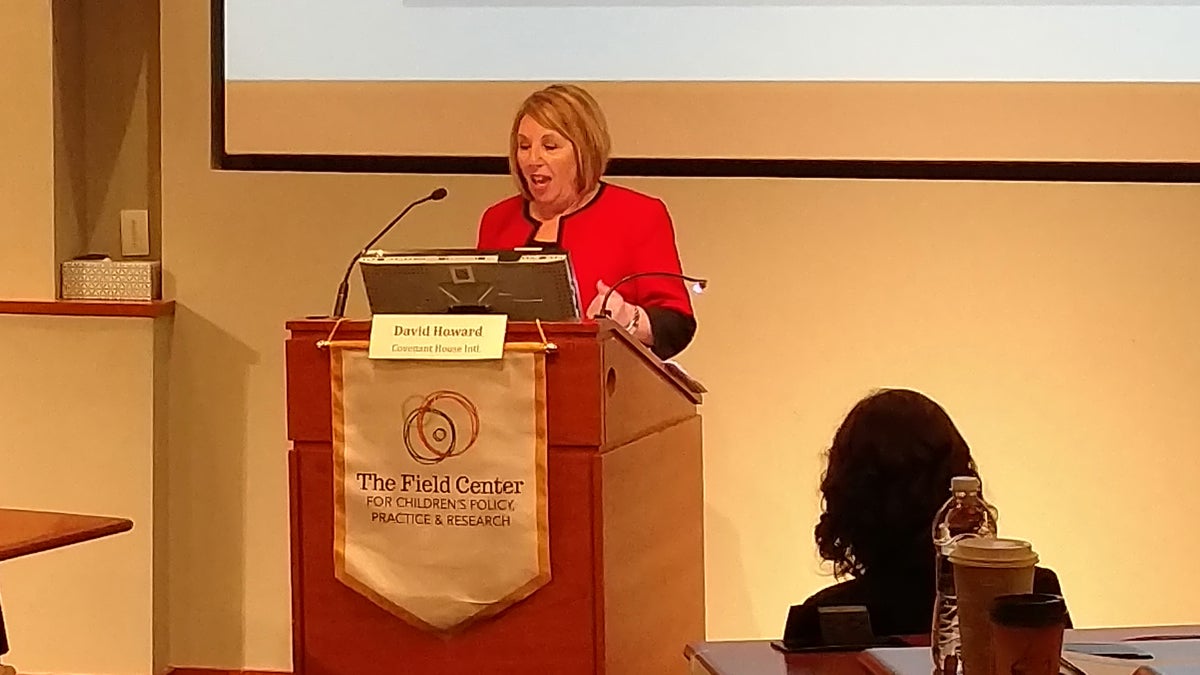One-fifth of homeless youth in Philly have been trafficked for sex, new study finds
Listen
Debra Schilling Wolfe, executive director of the Field Center for Children's Policy, Practice and Research, discusses a major new survey of nearly 1,000 homeless youth across the U.S. and Canada. It finds that about 20 percent of them were forced to work or sell their bodies for the profit of those who exploited them. (Katie Colaneri/WHYY)
It’s something advocates for homeless young people have known for a long time: That vulnerable population is often targeted by human traffickers.
Now, a major new survey of nearly 1,000 homeless youth in Philadelphia and 12 other cities across the U.S. and Canada has found about one-fifth or 19.4 percent of them were forced to work or sell their bodies for the profit of those who exploited them.
The survey was part of an effort by nonprofit Covenant House International to turn anecdotal evidence into hard data on the prevalence of trafficking among homeless young people. The organization claims this is the largest national study of its kind.
“We really haven’t done good research about this and part of it is access to young people who are trafficked or being victimized,” said Debra Schilling Wolfe, executive director of the Field Center for Children’s Policy, Practice and Research. “Because it’s an underground problem, it’s an underground population.”
Wolfe and a lead researcher from Loyola University presented preliminary findings Monday at a conference at Penn Law School.
The Field Center surveyed 270 homeless youth in three of the 13 cities: Washington, D.C., Phoenix and Philadelphia.
In Philadelphia alone, it found 18 percent were victims of sex trafficking, while 33 percent were involved in commercial sex work, such as stripping and prostitution.
While those figures are striking, Wolfe said, they don’t paint the full picture. All of those surveyed were getting help at Covenant House shelters or affiliates, leaving out many young people who are still on the streets.
“We had the first prosecution in Philadelphia of a hotel that was harboring a young person who was being sex trafficked — that person wouldn’t have been in our study, so we know that the numbers are out there, but we don’t know how great they are,” Wolfe said.
She also noted that the majority of survey participants were young men. Given that the women were more than twice as likely to report being victims of sex trafficking, Wolfe said, the numbers would have been higher if more women had been surveyed.
LGBTQ young people were disproportionately affected, the researchers found. For example, while transgender people made up just 4 percent of those surveyed in Washington, D.C., Phoenix and Philadelphia, 60 percent of them reported being trafficked for sex.
Most of the young people who had been trafficked for sex also reported dropping out of high school and a lack of supportive adults in their lives; 95 percent had a history of childhood sexual abuse or neglect.
Wolfe said these “risk factors” could point to policies that could prevent more teens and young adults from falling prey to traffickers.
“As one of the young people said to us, ‘I was sexually abused as a child, so it just was normalized for me that other people could touch my body whenever they wanted to,'” she said. “So I think if we target interventions for victims of child sexual abuse … that may reduce their likelihood of victimization.”
John Ducoff, who runs Covenant House of Pennsylvania, said this survey will help him and other advocates to make the case for more funding to provide shelter and counseling to more young people.
“This research report will allow us to go and say … if you want to reduce the incidence of human trafficking, make sure that every homeless young person has a safe place to stay,” he said.
“There are thousands of homeless young people in the city of Philadelphia,” he added. “We have to build a system that can serve and accommodate all of them.”
WHYY is your source for fact-based, in-depth journalism and information. As a nonprofit organization, we rely on financial support from readers like you. Please give today.

